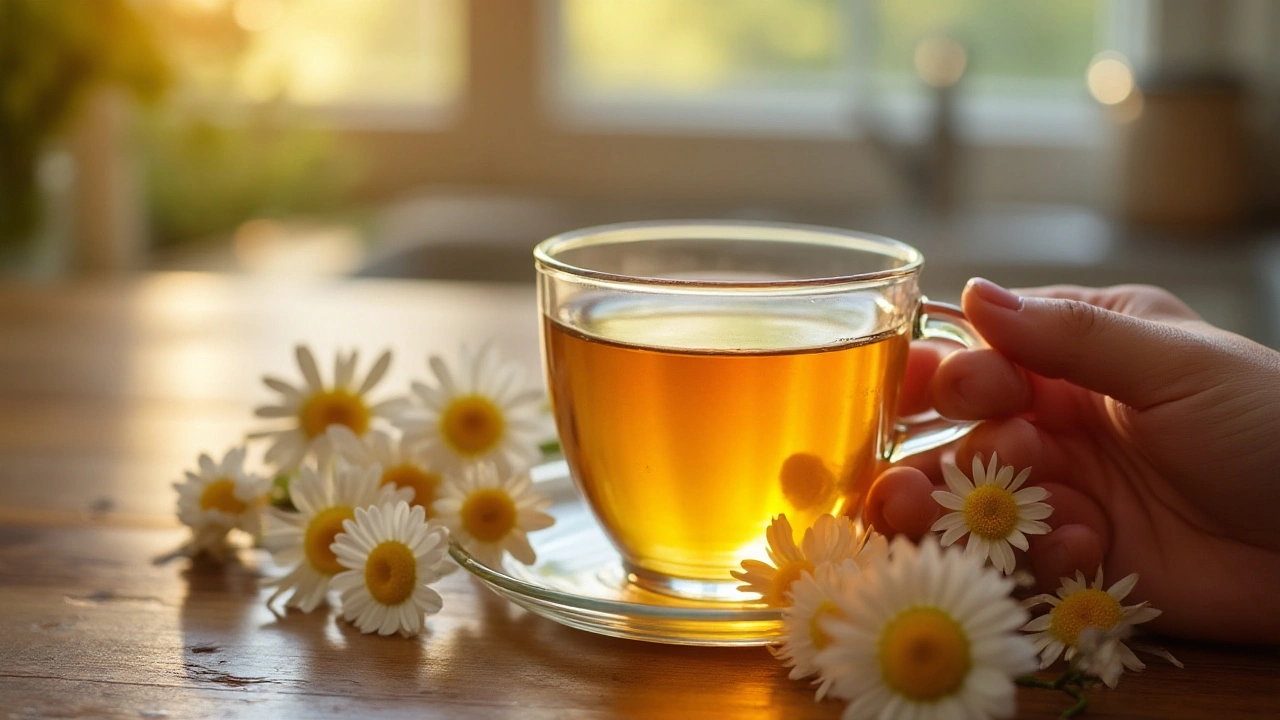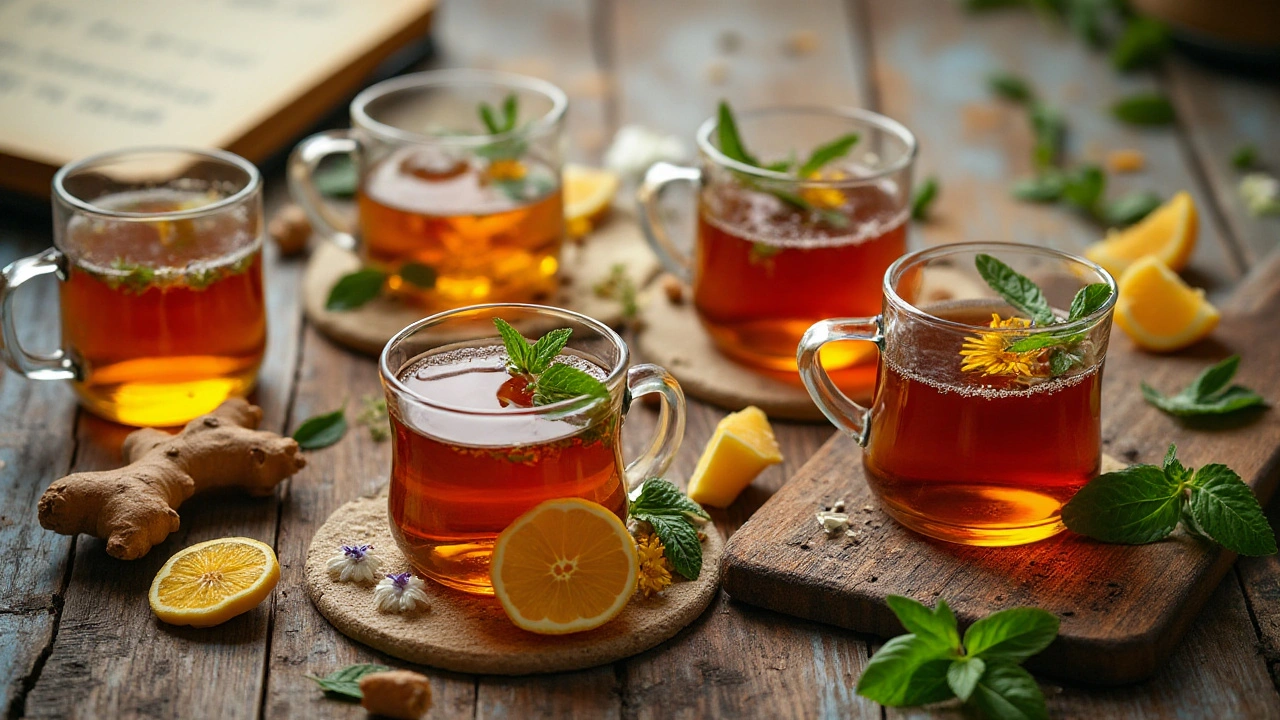Many people have experienced the discomfort of an upset stomach, and while medication is a common go-to, there's an alternative that has been effective for centuries: herbal teas. Steeped in tradition, these natural remedies offer a soothing touch to ease digestive woes.
Herbal teas are infused with various plant extracts, each bringing its own set of healing properties to the table. Understanding how these teas work can open pathways to natural relief and nurturing self-care.
- Understanding Herbal Teas
- Top Herbal Teas for Digestion
- Brewing Tips for Maximum Relief
- Cautions and Considerations
Understanding Herbal Teas
Herbal teas have been cherished for centuries, not just as comforting beverages, but as powerful home remedies for various ailments, including an upset stomach. Unlike traditional black or green teas derived from the Camellia sinensis plant, herbal teas are crafted from an array of plants, flowers, roots, and seeds. Each herbal blend carries unique properties that can influence your health and wellness significantly. A fascinating aspect of herbal teas is how they have been interwoven into the cultural tapestries of societies around the world, serving not only as nourishment but as a cultural touchstone.
What sets herbal teas apart is their sheer diversity. You might find yourself sipping a chamomile blend to unwind after a long day or choosing peppermint tea for its cool and refreshing flavor. Both have distinctive effects on the body. Herbal teas can be particularly soothing for digestive disturbances due to the gentle nourishment they provide, often laden with antioxidants and essential oils. Interestingly, the power of herbal teas lies in the active compounds found in these botanicals. For instance, the gingerol in ginger tea is known for its anti-inflammatory and anti-nausea properties, while chamomile is a rich source of flavonoids, which can offer calming effects.
A 1990 study published in the Journal of Herbs, Spices & Medicinal Plants, highlighted the medicinal potential of these teas. "Herbal teas may offer a natural alternative to synthetic drugs, with fewer side effects when prepared and consumed correctly," they noted in their findings. The potent qualities of herbal teas make them a compelling choice for anyone in search of natural solutions to manage an upset stomach.
While herbal teas can indeed be beneficial, it's also essential to know what you are consuming. Many pre-packaged teas in the market boast a barrage of added flavors, preservatives, and caffeine, which might offset their healing properties. To truly benefit from the therapeutic qualities of herbal teas, it is advisable to choose organic, whole-leaf options to ensure you are obtaining the potent herbal essence in every cup. Brewing your own from scratch can allow you not only to control what goes into your cup but also to tailor the blends specifically to your needs, offering a personalized tea experience.

Top Herbal Teas for Digestion
Exploring the realm of herbal teas can unlock a wealth of benefits, especially when it comes to managing digestive health. These teas harness the natural power of plants and have been trusted across cultures to aid the digestive process. Among the most renowned is peppermint tea, celebrated for its remarkable ability to relax the digestive tract muscles. This relaxation can ease symptoms of bloating and gas, making it an excellent choice for post-meal solace. Peppermint's distinctive aroma and menthol content not only invigorate the senses but also promote a healthy digestive flow, encouraging smooth functioning throughout the system.
Another superstar in the herbal hierarchy is ginger tea, which has long been favored for its potent anti-nausea properties. The warmth of ginger tea can soothe an upset stomach by improving circulation and providing anti-inflammatory effects. These attributes make ginger especially appealing to those experiencing motion sickness or queasiness during pregnancy. Research has even suggested that ginger can enhance gastric motility, aiding in the thorough breakdown of consumed foods. As ginger tea infuses your senses with its spicy kick, it works wonders internally, ensuring a balanced and calm digestive experience.
Chamomile tea, cherished for its gentle and calming effects, often complements digestion endeavors. It's an excellent companion before bedtime, helping to ease indigestion that might otherwise disrupt a peaceful slumber. This herbal infusion contains compounds that reduce inflammation in the digestive tract and support muscle relaxation. Its floral notes and soothing warmth envelop you in tranquility while busily fighting discomfort in the gut. Chamomile's ability to promote a state of calmness and relaxation cannot be overstated, supporting both mental well-being and digestive health.
In addition to these, fennel tea emerges as a gentle warrior against digestive trouble. Preferred for its mild, anise-like flavor, fennel works to curb flatulence, alleviate bloating, and reduce cramping issues. The phytonutrients within fennel seeds hold the secret to improved digestion and also boast antioxidant properties that enhance overall health. For mothers, fennel’s benefits even extend to easing infant colic, offering relief for both baby and parent. As you sip this comforting brew, it gently rebalances the digestive landscape, promoting harmony and balance within the system.
According to Dr. Alan Cohen, a leading gastroenterologist, "Herbal teas offer a symbiotic combination of flavor and function. Not only do they provide hydration, their diverse properties cater to a range of digestive needs, offering both immediate relief and long-term benefits."Combining these herbal teas creates a synergy that supports overall digestive health. Consider a cup of peppermint tea after meals, ginger tea during times of nausea, or a chamomile-fennel blend to unwind in the evening. Each cup boasts unique properties while aligning with nature's wisdom, offering not just relief but nourishment for your journey towards enhanced digestive well-being.

Brewing Tips for Maximum Relief
Getting the most out of your herbal teas when dealing with an upset stomach requires a bit of art and science. Each type of tea, from invigorating ginger to calming chamomile, offers unique properties that can soothe digestive disturbances. To harness these benefits, it's important to steep your tea properly. The art of brewing enhances not only the flavor but the efficacy of the tea’s active ingredients as well. A well-steeped tea provides a richer experience, highlighting the full potential of its natural compounds. The proper technique ensures that the active constituents like antioxidants, tannins, and essential oils are released effectively, maximizing the tea's soothing capabilities.
Start by ensuring you have fresh, high-quality ingredients. Teabags are convenient, but they often contain lower quality remnants of herbs, known as fannings and dust. Opt instead for loose-leaf teas if possible, which tend to be fresher and more robust in flavor and potency. The quality of water used also plays a crucial role. Using filtered water can make a big difference, as minerals and impurities can interfere with the flavors and health benefits of the herbs. Water temperature is another vital factor. For most herbal teas, boiling water works well, but delicate herbs like chamomile benefit from slightly cooler temperatures to prevent bitterness.
Control the steeping time with precision; too short, and you might miss out on the full range of benefits, too long, and you risk a bitter brew. Generally, a steeping time of five to ten minutes is recommended for herbal concoctions to extract the essence without overpowering flavors. Ginger tea, for instance, releases its full zesty and therapeutic effect when simmered gently, bringing out anti-inflammatory compounds like gingerols and shogaols. Adding a lid while brewing can keep the volatile oils from escaping, thereby enhancing the healing benefits.
According to renowned herbalist Rosemary Gladstar, "The longer you steep, the more medicinal your tea becomes." This advice allows one to tailor the potency of the herbal fiesta, matching it to the severity of the stomach issue at hand.
While preparing your tea, be mindful of any enhancements or additives. A bit of honey not only adds sweetness but can act as an additional soothing agent. Similarly, combining multiple herbal teas like adding some peppermint to ginger can create a synergistic effect, easing stomach spasms more effectively. Be cautious with add-ons like milk with certain tannin-rich teas, as they can form indigestible complexes, contrary to your healing intentions.
Balance is key when it comes to relieving symptoms naturally. Engaging in this harmonious ritual not only calms your upset stomach but also offers a moment for mindfulness and relaxation. In a world driven by quick fixes, taking the time to prepare a natural remedy not only nurtures your digestive health but also enriches your overall well-being.

Cautions and Considerations
While herbal teas can be a gentle and effective remedy for an upset stomach, there are certain precautions that one must keep in mind to avoid unintended consequences. Not every herb suits everyone, and some might trigger allergies or interact with medications. For example, chamomile tea is renowned for its calming effect, yet those allergic to daisies, ragweed, or marigolds may experience a similar reaction to this otherwise innocuous herb.
Pregnant women should exercise caution and consult with a healthcare provider before consuming herbal teas. Some teas, like peppermint, can exacerbate acid reflux by relaxing the lower esophageal sphincter. Conversely, ginger tea, widely appreciated for its digestive properties, may be a preferable choice, yet should still be consumed in moderation as excessive intake can sometimes lead to heartburn.
Moreover, preparing herbal tea requires discernment regarding water temperature and brewing time, crucial elements to unlock the full potential of these natural healers. For example, a study on the efficacy of certain herbal teas highlights the importance of not oversteeping, which can result in a bitter taste or even decreased potency.
Dr. Johanna Williams, a leading herbalist, notes, "Understanding the proper use of herbs is essential; their magic unfolds best with respect and knowledge."
One should also be aware of the source of the herbs. Opt for organic or well-sourced ingredients to avoid contaminants and unwanted additives. Always pay attention to how your body reacts to new teas, starting with small sips and observing any physiological changes. It's wise to keep track of what works and tailor your herbal selections to your body's specific needs and sensitivities for optimal digestive health.
Lastly, while herbal remedies provide valuable support, they aren't replacements for medical advice or treatment where needed. If stomach issues persist, seeking a professional diagnosis is imperative. This mindful approach ensures that herbal teas remain an ally, offering natural, soothing comfort while safeguarding your health journey.






The article offers a commendable overview of phytotherapeutic infusions. While the historical anecdotes are intriguing, a more rigorous analysis of active constituents would elevate the discourse. In practice, sourcing organic, whole‑leaf material remains paramount for therapeutic fidelity.
January 22katie clark